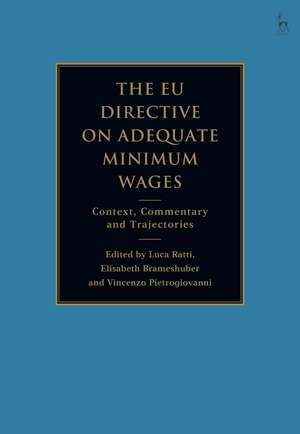The EU Directive on Adequate Minimum Wages: Context, Commentary and Trajectories
Editat de Luca Ratti, Elisabeth Brameshuber, Vincenzo Pietrogiovannien Limba Engleză Hardback – 6 mar 2024
Preț: 735.75 lei
Preț vechi: 1289.41 lei
-43% Nou
Puncte Express: 1104
Preț estimativ în valută:
140.80€ • 145.46$ • 117.18£
140.80€ • 145.46$ • 117.18£
Carte disponibilă
Livrare economică 04-18 martie
Preluare comenzi: 021 569.72.76
Specificații
ISBN-13: 9781509968725
ISBN-10: 1509968725
Pagini: 720
Dimensiuni: 169 x 244 x 39 mm
Greutate: 1.18 kg
Editura: Bloomsbury Publishing
Colecția Hart Publishing
Locul publicării:London, United Kingdom
ISBN-10: 1509968725
Pagini: 720
Dimensiuni: 169 x 244 x 39 mm
Greutate: 1.18 kg
Editura: Bloomsbury Publishing
Colecția Hart Publishing
Locul publicării:London, United Kingdom
Caracteristici
Broadens the view on the Directive on adequate minimum wages by providing a sound conceptualisation of its key principles
Notă biografică
Luca Ratti is Associate Professor of European and Comparative Labour Law at the University of Luxembourg, Luxembourg. Elisabeth Brameshuber is Professor of Labour and Social Security Law at the University of Vienna, Austria. Vincenzo Pietrogiovanni is Associate Professor of Labour Law at Lund University, Sweden.
Cuprins
1. Introduction: Regulating Minimum Wages as Fundamental Challenge for EU LawLuca Ratti (University of Luxembourg, Luxembourg), Elisabeth Brameshuber (University of Vienna, Austria) and Vincenzo Pietrogiovanni (University of South Denmark, Denmark)Part I: Cross-Cutting Themes2. In Search of Adequacy in Contemporary Labour Markets, Zoe Adams (University of Cambridge, UK)3. Choosing a Tightrope instead of a Rope Bridge - The Choice of Legal Basis for the EU Minimum Wage Directive, Sacha Garben (College of Europe, Belgium)4. The Impact of the Minimum Wage Directive on EU Labour Law, Claudia Schubert (University of Hamburg, Germany)5. The Legal Institutions of Collective Bargaining on Wage Setting, Vincenzo Bavaro (University of Bari, Italy)6. The Collective Bargaining Directive in Disguise - How the European Minimum Wage Directive Aims to Strengthen Collective Bargaining, Torsten Müller (European Trade Union Institute for Research, Belgium) and Thorsten Schulten (Hans-Böckler-Stiftung Foundation, Germany)7. Minimum Wages in OECD Countries, Andrea Garnero (OECD, France)8. The Directive on Adequate Minimum Wages and The Revival of a European Social Union, Luca Ratti (University of Luxembourg, Luxembourg)9. Constitutionalisation and Social Rights - A Fundamental Right to Adequate Minimum Wages? Elisabeth Brameshuber (University of Vienna, Austria)Part II: Commentary of the Text of the Directive10. Subject Matter (Article 1), Erika Kovács (WU Vienna University of Economics and Business, Austria)11. Scope (Article 2), Emanuele Menegatti (University of Bologna, Italy)12. Definitions (Article 3), Mijke Houwerzijl (Tilburg University, Netherlands)13. Promotion of Collective Bargaining on Wage Setting (Article 4), Antonio Lo Faro (University of Catania, Italy)14. Procedure for Setting Adequate Statutory Minimum Wages (Article 5), Adam Sagan and Alexander Schmidt (University of Bayreuth, Germany)15. Variations and Deductions (Article 6), Piotr Grzebyk (Warsaw University, Poland)16. Involvement of Social Partners in the Setting and Updating of Statutory Minimum Wages (Article 7), Antonio Garcia-Muñoz (University of Luxembourg, Luxembourg)17. Effective Access of Workers to Statutory Minimum Wages (Article 8), Bartlomiej Bednarowicz (European Economic and Social Committee) and Ane Aranguiz (Tilburg University, Netherlands)18. Public Procurement (Article 9), Anne C L Davies (University of Oxford, UK)19. Monitoring and Data Collection (Article 10) and Information on Minimum Wage Protection (Article 11), Rüdiger Krause (University of Göttingen, Germany)20. Right to Redress and Protection Against Adverse Treatment or Consequences (Article 12), Sylvaine Laulom (French Cour de Cassation, France)21. Penalties (Article 13), Piera Loi (University of Cagliari, Italy)22. Dissemination of Information (Article 14) - Evaluation and Review (Article 15), Non-Regression and More Favourable Provisions (Article 16) - Transposition and Implementation (Article 17) - Entry into Force (Article 18) - Addressees (Article 19), Jérôme Porta, University of Bordeaux, France)Part III: The Impact of the Directive in the Member States23. Austria, Thomas Dullinger (University of Vienna, Austria)24. South-Eastern European States: Croatia and Slovenia, Luka Ticar (University of Ljubljana, Slovenia) and Ivana Grgurev (University of Ljubljana, Slovenia)25. Baltic States, Daiva Petrylaite (Vilnius University, Lithuania) and Vida Petrylaite (Vilnius University, Lithuania)26. Belgium, Filip Dorssemont (Université Catholique de Louvain, Belgium)27. Cyprus and Greece, Stamatina Yannakourou (European University Cyprus, Cyprus)28. France, Gwenola Bargain (University of Tours, France)29. Germany, Monika Schlachter-Voll (University of Trier, Germany)30. Hungary, Tamás Gyulavári (University of Budapest, Hungary)31. Iberian States, Teresa Coelho Moreira (University of Minho, Portugal) and Daniel Pérez del Prado (Universidad Carlos III Madrid, Spain)32. Ireland, Mark Bell (University College Dublin, Ireland) and Alan Eustace (University of Oxford, UK)33. Italy, Orsola Razzolini (University of Milan, Italy)34. Poland, Marta Otto (University of Lodz, Poland) and Izabela Florczak (University of Lodz, Poland)35. Scandinavian States, Petra Herzfeld Olsson (Stockholm University, Sweden) and Mette Søsted Hemme (Aarhus University, Denmark)
